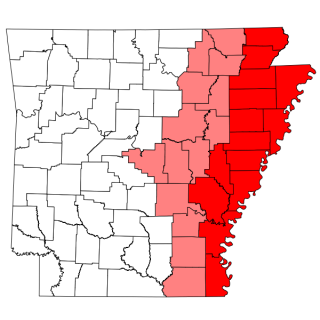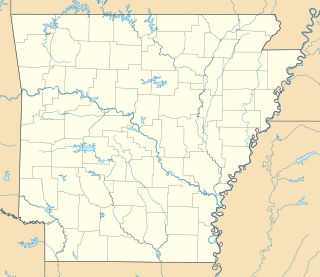Related Research Articles

Arkansas is a state in the south central region of the United States, home to more than three million people as of 2018. Its name is from the Osage language, of Siouan derivation; it denoted their related kin, the Quapaw people. The state's diverse geography ranges from the mountainous regions of the Ozark and the Ouachita Mountains, which make up the U.S. Interior Highlands, to the densely forested land in the south known as the Arkansas Timberlands, to the eastern lowlands along the Mississippi River and the Arkansas Delta.

Prairie County is in the Central Arkansas region of the U.S. state of Arkansas. The county is named for the Grand Prairie, a subregion of the Arkansas Delta known for rice cultivation and aquaculture that runs through the county. Created as Arkansas's 54th county in 1846, Prairie County is home to four incorporated towns, including DeValls Bluff, the southern district county seat, and two incorporated cities, including Des Arc, the northern district county seat. The county is also the site of numerous unincorporated communities and ghost towns. Occupying 676 square miles (175,000 ha), Prairie County is the median-sized county in Arkansas. As of the 2010 Census, the county's population is 8,715 people in 4,503 households. Based on population, the county is the ninth-smallest county of the 75 in Arkansas.

Chicot County is a county located in the southeastern corner of the U.S. state of Arkansas. As of the 2010 census, the population was 11,800. The county seat is Lake Village. Chicot County is Arkansas's 10th county, formed on October 25, 1823, and named after Point Chicot on the Mississippi River. It is part of the Arkansas Delta, lowlands along the river that have been historically important as an area for large-scale cotton cultivation.

The Elaine massacre occurred on September 30–October 1, 1919, at Hoop Spur in the vicinity of Elaine in rural Phillips County, Arkansas. Some records of the time state that eleven black men and five white men were killed. Estimates of deaths made in the immediate aftermath of the Elaine Massacre by eyewitnesses range from 50 to "more than a hundred". Walter Francis White, an NAACP attorney who visited Elaine shortly after the incident stated "... twenty-five Negroes killed, although some place the Negro fatalities as high as one hundred". More recent estimates of the number of black people killed during this violence are higher than estimates provided by the eyewitnesses, recently ranging into the hundreds. The white mobs were aided by federal troops and terrorist organizations like the Ku Klux Klan. According to the Encyclopedia of Arkansas, "the Elaine Massacre was by far the deadliest racial confrontation in Arkansas history and possibly the bloodiest racial conflict in the history of the United States".

The Mississippi Delta, also known as the Yazoo-Mississippi Delta, is the distinctive northwest section of the U.S. state of Mississippi which lies between the Mississippi and Yazoo Rivers. The region has been called "The Most Southern Place on Earth", because of its unique racial, cultural, and economic history. It is 200 miles (320 km) long and 87 miles (140 km) across at its widest point, encompassing about 4,415,000 acres (17,870 km2), or, almost 7,000 square miles of alluvial floodplain. Originally covered in hardwood forest across the bottomlands, it was developed as one of the richest cotton-growing areas in the nation before the American Civil War (1861–1865). The region attracted many speculators who developed land along the riverfronts for cotton plantations; they became wealthy planters dependent on the labor of black slaves, who composed the vast majority of the population in these counties well before the Civil War, often twice the number of whites.

Lake Chicot is a lake adjacent to the Mississippi River. The lake is located on the east side of Lake Village, Arkansas in Chicot County. It is not only the largest oxbow lake in North America, but the largest natural lake in Arkansas, formed 300 years ago by the meandering of the Mississippi River.

LeRoy Percy was an attorney, planter, and politician in Mississippi. In 1910, he was elected by the state legislature to the US Senate and served until 1913.
Austin Corbin was a 19th-century American banking and railroad entrepreneur. He consolidated the rail lines on Long Island bringing them under the profitable umbrella of the Long Island Rail Road (LIRR). He was the owner of Manhattan Beach, a resort in Brooklyn, New York City, from which he barred Jews. He was also the owner of the Sunnyside Plantation in Chicot County, Arkansas from 1886 to his death in 1896, where he used convict laborers and later brought Italian immigrants to work on the land.

The history of Arkansas began millennia ago when humans first crossed into North America. Many tribes used Arkansas as their hunting lands but the main tribe was the Quapaw, who settled in the Arkansas delta upon moving south from Illinois. Early French explorers gave the territory its name, a corruption of Akansea, which is a phonetic spelling of the Illinois word for the Quapaw. This phonetic heritage explains why "Arkansas" is pronounced so differently than "Kansas" even though they share the same spelling. What began as a rough wilderness inhabited by trappers and hunters became incorporated into the United States as part of the Louisiana Purchase in 1803 and became the Territory of Arkansaw in 1819. Upon gaining statehood in 1836, Arkansas had begun to prosper under a plantation economy that was heavily reliant on slave labor. After the American Civil War, Arkansas was a poor rural state based on cotton. Prosperity returned in the 1940s and it became famous for its political leadership, including President Bill Clinton, and as the base for the Walmart Corporation.

The Arkansas Delta is one of the six natural regions of the state of Arkansas. Willard B. Gatewood Jr., author of The Arkansas Delta: Land of Paradox, says that rich cotton lands of the Arkansas Delta make that area "The Deepest of the Deep South."

The geography of Arkansas varies widely. The state is covered by mountains, river valleys, forests, lakes, and bayous in addition to the cities of Arkansas. Hot Springs National Park features bubbling springs of hot water, formerly sought across the country for their healing properties. Crowley's Ridge is a geological anomaly rising above the surrounding lowlands of the Mississippi embayment.
The immense obstacles that these Italian immigrants faced in assimilating into the broader society were far from easy, while also attempting to preserve their identity, culture, and traditions in a new land. Italian immigrants are responsible for developing and contributing to the region now known as Mississippi.

Mary Grace Quackenbos Humiston (1869–1948) was the first female Special Assistant United States Attorney. She was a graduate of the New York University School of Law and was a leader in exposing peonage in the American South. She was also known for a short time as "Mrs. Sherlock Holmes", starting with her work solving the cold case of Ruth Cruger who disappeared in New York in 1917.
Lycurgus Johnson (1818-1876) was an American cotton planter and large slaveholder in the Arkansas Delta during the antebellum years. Born to the powerful political and planter Johnson family in Scott County, Kentucky, he became the owner and developer of the Lakeport Plantation in Chicot County, Arkansas. It bordered the west bank of the Mississippi River.
The Sunnyside Plantation was a cotton plantation near Lake Village in Chicot County, Arkansas, in the Arkansas Delta region. Built as a cotton plantation in the Antebellum South, it was farmed using the forced labor of African American slaves. After the American Civil War of 1861-1865, freedmen farmed it. From the 1890s to the 1910s, it used convict laborers and employed immigrants from Northern Italy, many of whom were subject to peonage. They were later replaced by black sharecroppers. The plantation was closed down and it was broken up in the 1940s. Nowadays, only a historical marker reminds Lake Village residents and visitors of its history.

John Caldwell Calhoun II (1843–1918) was an American planter and businessman. He was a large landowner in Chicot County, Arkansas and a Director of railroad companies. He was a prominent financier and developer of the "New South".
Mary Bucci Bush is an American author and a professor of English and creative writing at California State University, Los Angeles.

Sweet Hope (2011), an award-winning historical novel by Mary Bucci Bush, tells the story of Italian immigrants living in peonage on a Mississippi Delta cotton plantation in the early 1900s. It was inspired by the experiences of Bush's grandmother, Pasquina Fratini Galavotti, who worked on the Sunnyside Plantation in Arkansas as a child.

Established initially as Alta Villa by Italian immigrants in 1915, Little Italy is an unincorporated community in Pulaski and Perry counties in the U.S. state of Arkansas. The culturally rich and historically significant hamlet is located in high terrain along Arkansas Highway 300 amidst the northeastern foothills of the Ouachita Mountains bestriding Wye Mountain and Kryer Mountain. As part of a multi-decade heritage preservation effort, its residents are currently seeking status as an incorporated municipality.
Pietro Bandini was an Italian Catholic priest and missionary to the United States who was prominent in the Italian American community. He began his career as a Jesuit missionary in the Western United States, where he worked with Native American tribes, and went on to establish the Saint Raphael Society for the Protection of Italian Immigrants and Our Lady of Pompeii Church in New York City. He led a group of Italians to Sunnyside Plantation in Arkansas in the hopes of establishing an immigrant colony and later founded the city of Tontitown with them. For his work on immigration, he was lauded by Pope Pius X and the Queen Mother Margherita.
References
- 1 2 "The parable of Italians in the South". The Economist . Retrieved 2017-08-01.